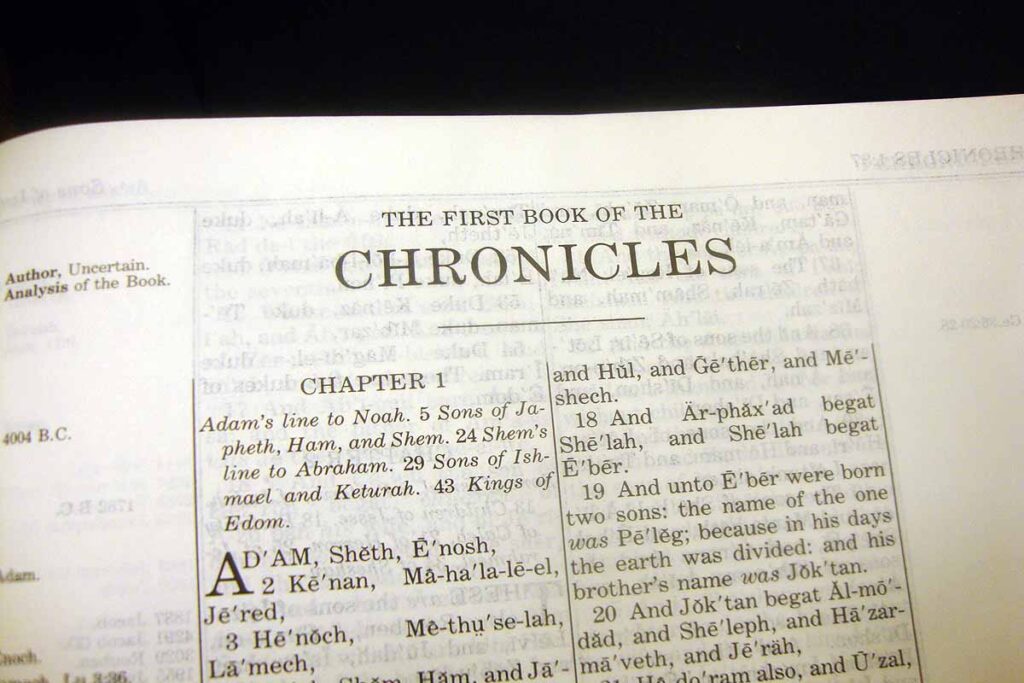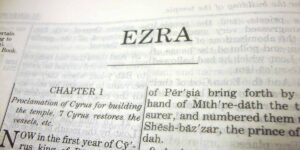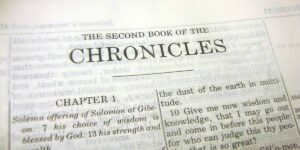The writer of First Chronicles begins his work with an extensive genealogy. He traces the roots of the nation in a literary family reunion from Adam onward, recounting its royal line and the loving plan of a personal God. We read First Chronicles and gain a glimpse of God at work through his people for generations. If you are a believer, these people are your ancestors too. As you approach this part of God’s Word, read the names with awe and respect, and gain new security and identity in your relationship with God.
The long list of names that follows presents a history of God’s work in the world from Adam through Zerubbabel. Some of these names remind us of stories of great faith, and others of tragic failure. About most of these people named, however, we know nothing. But those who died unknown to us are known by God. God will also remember us when we die.
First Chronicles begins with Adam, and, for nine chapters, the writer gives us a “Who’s Who” of Israel’s history with special emphasis on David’s royal line. The rest of the book tells the story of David – the great man of God, Israel’s king – who served God and laid out the plans for the construction of and the worship in the temple.
David loved the Lord and wanted to build a temple to replace the tabernacle, but God denied his request. David’s greatest contribution to the temple would not be the construction, but the preparation. We may be unable to see the results of our labors for God in our lifetime, but David’s example helps us understand that we serve God so he will see his results, not so we will see ours.
First Chronicles is an invaluable supplement to Second Samuel and a strong reminder of the necessity for tracing our roots and thus rediscovering our foundation. As you read First Chronicles, trace your own godly heritage, thank God for your spiritual forefathers, and recommit yourself to passing on God’s truth to the next generation.
Writer of First Chronicles
Ezra is the most likely candidate for the authorship of 1 and 2 Chronicles. The early Jewish tradition of the Talmud affirms that Ezra wrote 1 and 2 Chronicles. The last verses of 2 Chronicles are repeated in the first three verses of the book of Ezra (originally written with Nehemiah as one book), probably indicating they went together in the original version. Most scholars agree that these four books were written and compiled by the same person, but not all accept the theory of Ezra’s authorship.
Date Written
Approximately 430 B.C., recording events that occurred from about 1000-960 B.C.
Historical Setting of First Chronicles
The books of First and Second Chronicles cover several centuries of the history of God’s covenant people – from the founders of the nation until the end of their captivity in Babylon and Persia about 538 B.C. The stage is set for the return of the Jewish people to Jerusalem after the Persians defeat Babylon and become the dominant power of the ancient world.
Theological Contribution
The books of First and Second Chronicles should not only be read as histories but for their insights into how God has kept faith with His covenant people across the centuries. By selecting events that show God has kept His promises, the author presents a beautiful doctrine of hope that begins with Adam and stretches to the end of the captivity of God’s people thousands of years later. The clear implication for Christians today is that He is still a God of hope whose ultimate purpose will prevail in the world and in the lives of His people.
Recommended Bible Study Resources
ESV Study Bible – Study Bibles give you a deeper understanding of God’s Word with tools for life application like commentary, maps, charts, concordance, and study notes. Search our popular translations- NIV, ESV, NKJV, KJV and more!
Believer’s Bible Commentary: Second Edition – A Bible commentary is a written, systematic series of explanations and interpretations of Scripture. Commentaries often analyze or expound on individual books of the Bible, chapter by chapter and verse by verse. Some commentary works provide analysis of the whole of Scripture.
The New Strong’s Expanded Exhaustive Concordance of the Bible – The best concordance for word study! This exclusive new edition of a legendary classic puts generations of biblical research at your fingertips. A valuable tool for pastors, teachers, and students of the Bible.
Vine’s Complete Expository Dictionary of Old and New Testament Words – This classic word study resource allows you to study the meaning of biblical words in the original languages without spending years learning Greek or Hebrew. A great resource for students, seasoned pastors, and anyone who enjoys biblical word studies–even if they have little to no formal training in Hebrew or Greek.
Halley’s Bible Handbook – The beloved and classic Bible companion has been thoroughly updated, while retaining its time-honored features and Dr. Halley’s highly personal style, to offer even greater clarity, insight, and usefulness.
Click here to download or print the Bible outline “First Chronicles – A History of Judah & Israel“






